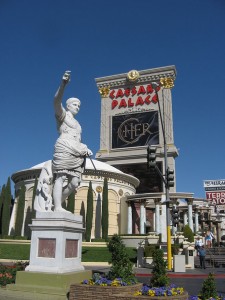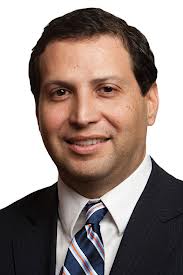A federal case against an unlicensed, do-it-yourself sports book collapsed like a pup tent when a federal judge tossed out both the premise of an FBI search and, by extension, the  evidence gathered therefrom. In a warrantless search, G-men cut the Internet access to Paul Phua‘s high-roller villa at Caesars Palace, then took a peek at the premises under the pretense (and guise) of being repairmen. Simply put, “The government violated the defendant’s Fourth Amendment rights,” said U.S. District Judge Andrew Gordon. While the case against Phua is still alive, it’s on life support.
evidence gathered therefrom. In a warrantless search, G-men cut the Internet access to Paul Phua‘s high-roller villa at Caesars Palace, then took a peek at the premises under the pretense (and guise) of being repairmen. Simply put, “The government violated the defendant’s Fourth Amendment rights,” said U.S. District Judge Andrew Gordon. While the case against Phua is still alive, it’s on life support.
As Judge Gordon wrote, “Permitting the government to create the need for the occupant to invite a third party into his or her home would effectively allow the government to conduct warrantless searches of the vast majority of residences and hotel rooms in America.” The best the government could do by way of pushback was for the prosecution’s Kimberly Frayn to argue, “There is not a constitutional right to DSL.” Ironically, while Phua will probably escape Uncle Sam’s wrath, six other defendants, including his son Darren, pled out to petty charges, forfeited cash and accepted five-year banishments from the U.S. It is unclear whether Judge Gordon’s ruling will change their fate.
* Another state’s resistance to casino-style gambling is buckling at the knees. Lawmakers in Wyoming have embarked on a study that will look into “instant racing” (presumably for the benefit of Wyoming Downs), pokers, perhaps even full-fledged casinos. The state already has tribal gaming. “If the Management Council decides that’s where we want to go, or if this committee wants to push something like that through, we’re looking at a two-year project,” said Sen. Leland Christensen, referring to a regulatory apparatus. Lawmakers also want to know what is wagered on various games in other states. If it’s following the money with that much diligence, Wyoming’s fledgling effort must be taken seriously.
* By contrast, a shift to the right in the Lege and a budget surplus are dooming attempts to expand gaming in Texas. That hasn’t deterred a flurry of bills from being filed. Most far- reaching is Rep. Carol Alvarado‘s proposal to open the entire state to private-sector and tribal casinos. More circumscribed are Rep. Senfronia Thompson‘s attempt to extend tribal gaming to the Ysleta del Sur Pueblo and Alabama-Coushatta tribes. Rep. Poncho Nevarez (D, left) wants to bump up Kickapoo Lucky Eagle Casino to Class III status, while Rep. Richard Raymond (D) would have controversial “eight-liners” voted upon at the local level. Rep. Joe Deshotel (D) is pushing for casinos in Galveston and other coastal areas, to fund disaster relief (thereby putting the casinos in the path of greatest danger from hurricanes and other foul weather). Unfortunately, all these proposals are coming from the left side of the aisle and Texas is likely to continue missing out on a multi-billion-dollar business for some time to come.
reaching is Rep. Carol Alvarado‘s proposal to open the entire state to private-sector and tribal casinos. More circumscribed are Rep. Senfronia Thompson‘s attempt to extend tribal gaming to the Ysleta del Sur Pueblo and Alabama-Coushatta tribes. Rep. Poncho Nevarez (D, left) wants to bump up Kickapoo Lucky Eagle Casino to Class III status, while Rep. Richard Raymond (D) would have controversial “eight-liners” voted upon at the local level. Rep. Joe Deshotel (D) is pushing for casinos in Galveston and other coastal areas, to fund disaster relief (thereby putting the casinos in the path of greatest danger from hurricanes and other foul weather). Unfortunately, all these proposals are coming from the left side of the aisle and Texas is likely to continue missing out on a multi-billion-dollar business for some time to come.
* In less than a year, Hard Rock Sioux City has racked up $8,000 in fines for catering to self-excluded gamblers. They’ll have to do better than that.
* If you’re playing at Harrah’s New Orleans, better stub out that cigarette. A challenge to New Orleans‘ smoking ban by a litany of bars, strip joints and by Caesars Entertainment was quashed. Opponents of the ban say it will cost the city $3 million in lost revenue and enforcement.
* It may become easier to bet at state-approved online casinos now that a new transaction code has been added, getting punters around the dreaded 7995 coding. Paddy Power President Eamonn Toland says the new code, which “crucial [to satisfying banks] … may be necessary but not sufficient.” Experts say that, legalities aside, the minute nature of the U.S. Internet-gambling market gives them no incentive to accept transactions of that nature. “I don’t think it’s going to be a silver bullet,” gloomily predicts CAMS CEO Matthew Katz, whose online platform supports New Jersey casinos, echoing those who say the market isn’t big enough to make banks give a damn.

